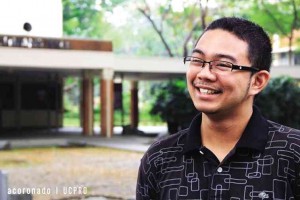Alisson Ladaga was in the eight-day seniors’ retreat when he heard that he had been chosen as valedictorian of Ateneo de Manila University Class 2014, news that he never expected.
Ladaga, Alich to friends, tried to remember his answers to the panel but could not recall making any remarkable statements.
But he thought he knew what the panelists saw in him.
“Each moment is a gate to innumerable possibilities, all basically up to how we make sense of and use what we have been given,” he said.
A native of Bohol province, Ladaga was set to enter a medical school in Cebu City until the spiritual director of his high school’s retreat,
Fr. Xavier Olin, SJ, convinced him to enroll at Ateneo.
So, he took up psychology at Ateneo on a scholarship because he had always found people phenomenal and he wanted a “holistic approach” for his future patients.
Ladaga will soon be pursuing his dream of becoming a doctor on a merit scholarship at Ateneo School of Medicine and Public Health (ASMPH).
Person for others
But now, he is driven more by a desire to inspire patients, something he saw in his doctor in Cebu. Ladaga had glaucoma, which left his right eye clinically blind.
He said he learned from his doctor that everybody, even the disabled or differently abled, could help others. “Whatever you have, whatever cross you carry, whatever difficulty in life, whatever situation you are in, there will always be an opportunity to give and be grateful,” Ladaga said.
From being a nerdy and grade-conscious student in high school, Ladaga’s transformation took him beyond himself and made him a person for others.
Being a person for others, the Ateneo motto, he said, was about caring, sharing and daring.
School activities, such as the National Service Training Program, the Junior Engagement Program, immersions and many other opportunities for student engagement, taught him to be more considerate of other people.
Inquirer columnist
Dr. Queena Lee-Chua taught Ladaga a lesson in power. Wanting to become a doctor to be in a position of power, Chua told him there was nothing wrong with wanting power, as long as he did not allow himself to be corrupted.
It took him quite a while to get used to Manila and Ateneo, suffering from culture shock. It was also hard to be away from his family and the way of life that he was used to.
Ladaga found a surrogate family in the dormitory, bonding with other students who felt the same way.
“In the dorm… I was not the only one who felt intimidated. [Although] they were coping in different ways, [I] realized that we could inspire each other,” Ladaga said.
He joined a couple of organizations during his four-year stay at Ateneo but it was to Gawad Kalinga-Ateneo Student Volunteers that he became deeply committed.
“I spent most of my time there… to help other students, to see the joy in helping out others, especially the hungry and the homeless,” he said.
Ladaga joined different organizations and pursued various extracurricular activities because he wanted to learn in and outside a classroom.
Committed to learning
He said he had to read a lot for his psychology course, including textbooks and journals, “but I committed myself to learning even beyond those pages.”
He said he did not find his extracurricular involvement time-consuming but instead an opportunity for continuous learning, allowing him to apply what he read in his relationships with people.
The cum laude who, with his groupmates, won the psychology department’s 2014 best undergraduate thesis award, said dealing with both academic and extracurricular obligations involved more than just achieving a balance.
“The world will always pressure you to balance things—academics and nonacademics—but maybe, more than balance, what we need is harmony. It’s more about listening to your body, listening where the wind wants you to be,” he said.
Academically, he said, he could not claim to have learned everything “but what I think is more important in studying— and I hope other people will see it this way—is… you just have to learn everything by heart.”
